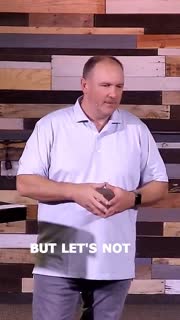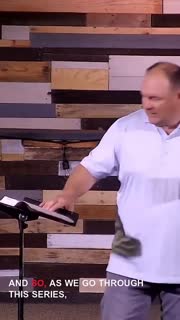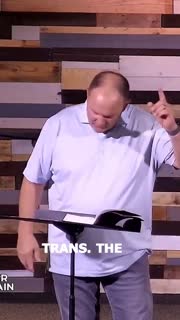Embracing God-Given Identity Amidst Cultural Challenges
Devotional
Sermon Summary
Bible Study Guide
Sermon Clips
1. "But let's not say, oh, I've always felt home in my body. Every one of us, our body tells us that this world is broken. And the older you get, the more you feel it every day, right? The pain, after 50, the pain just moves. The pain never leaves. It just moves throughout your body. But every one of us, our bodies are broken. Every one of us points within us and says, something's not right. And that is true. Now times that by 10. Times that by 10. Times that by 100. And that's what a person feels like, who feels like God made a mistake. Have you ever felt that way? feel like God made a mistake. So today, my goal, my prayer, I know it's a difficult challenge, and I will fall short. But it's to offer hope and clarity. It's not to disparage. It's not to attack or demean anyone." [00:42] (55 seconds)
2. "And so, as we go through this series, just to keep in mind the first weekend, we set the foundation and we talked about the kingdom of man, the kingdom of God. Because that dictates how we think about every issue that you and I are ever faced with on this side. And the kingdom of man says, I decide who I am and what I get to do. And the kingdom of God, says, God has the authority to tell me what to do, and I submit to that. And every issue we face falls into one of those two categories. You have the decision to make. Am I going to follow the kingdom of God, or am I going to follow the kingdom of man?" [02:08] (41 seconds)
3. "As believers, we need to think critically about current topics, but we also need to seek to understand. We've been saying every week, I see you, I empathize with you. So to empathize means there needs to be a certain amount of understanding. And the third one, is I'm here to help you. And so I would ask for that. There are people within our church who have family members, who have children, who have grandchildren, who have had these conversations with them to say, hey, I know I was raised as your daughter, but now I'd like to be your son, or vice versa, or uncles, or aunts, or grandchildren. So this is a very relevant subject. And the question is, we need to know, how do I respond? How do I follow Jesus and honor God, and at the same time, be honest and be gracious, too? It's a legitimate question, and something we need to wrestle with." [04:19] (63 seconds)
4. "Have you ever felt like you're not at home in your body? Let's be honest. Has anybody in the room ever felt like, yeah, I wish my body was different? Yeah, me too. I wish I had a full head of hair. I wish I was a little taller. When I was a kid, I wish I could run faster. I wish I was better in some sports. I wish I played my trumpet better. I mean, there are a lot of things. I wish God had gifted me differently than what he gave me, but this is the body that he gave me. And that's the body that he gave you. But let's not, let's not say, well, I've always felt home in my body. Every one of us, our body tells us that this world is broken. And the older you get, the more you feel it every day, right? The pain, after 50, the pain just moves. You never, the pain never leaves. It just moves throughout your body. But every one of us, our bodies are broken. Every one of us points within us and says, something's not right. And that is, that is true. Now times that by 10, times that by a hundred. And that's what a person feels like, who feels like God made a mistake. Have you ever felt that way? I feel like God made this mistake. So today, my goal, my prayer, I know it's a difficult challenge and I will fall short, but it's to offer hope and clarity. It's not to disparage. It's not to attack or demean anyone. That is not what we're to be known for, but to speak truth with grace. And wherever you are in your faith journey, you are welcome here. And I believe it's our posture that we want to help whatever you're going through." [08:40] (104 seconds)
5. "Who I am determines whose I am. And whose I am determines who I am. God determines who I am. There's things about my body I wish would change. Christians tend to downplay the body, but throughout scripture, the body is actually really important. You're going to be with your body for eternity. I'm hoping we get the upgraded version, right? But God, bodies are really, really important. Paul writes in 1 Corinthians 6, 19 through 20, he tells us that our bodies don't ultimately belong to us. Do you not know that your body is a temple of the Holy Spirit within whom you have from God? You are not your own. You are bought with a price. So therefore glorify God with your body. That tells me there's a way I cannot glorify God with my body." [16:49] (53 seconds)
6. "Your goal and my goal, according to the Bible, is not to be more of a man or more of a woman. It's to be more like Christ. Make your focus to be transformed to the image and the person of Christ. And your womanhood and your manhood will play out in that. But don't apologize for who God made you, for the interests that you have. David, my goodness, was a musician and wrote all of the Psalms. He was a poet. Did that make him less of a man? He's a man after God's own heart. Oh, by the way, he was also a warrior and a king, but a musician and a poet. The Proverbs 31 woman, I mean, that's an incredible, incredible passage women to aspire to. A woman who takes care of her household, but then goes out and is an entrepreneur and does business in the streets and takes from her profit and gives to the poor. But then you have pictures of women like Deborah, a violent judge in the Old Testament. Don't mess with her, right? And so sometimes we get into trouble when we categorize that men and women have to look a certain way. And if you've ever not felt welcome in a church based on your gender, I'm sorry. I'm sorry for that. Because what it means to be a man, what it means to be a woman is so much bigger and broader." [23:14] (85 seconds)
7. "The answer is not trans. The answer is transformation. The answer is Jesus Christ to follow Jesus. The gospel is our only hope. It's to die to ourselves. Galatians 2.20 says, for I am crucified with Christ. I don't get to decide how God chooses to use me in this world. I've already given that up when I gave my life to Jesus. And so the answer through this entire series is not for a Democrat to become a Republican or a Republican to become a Democrat. It's not for a straight man to become a gay man or a gay to become straight. It's not to become pro-life or to pro-choice or vice versa. The goal is to present Jesus. People need Jesus." [38:21] (43 seconds)
8. "Who you are is found in whose you are. Whose you are is found, your identity. There's a creator who made you, created you, gave you your gender, was very specific with that. Genders have equal value, different roles." [39:40] (23 seconds)
Ask a question about this sermon
2. "And so, as we go through this series, just to keep in mind the first weekend, we set the foundation and we talked about the kingdom of man, the kingdom of God. Because that dictates how we think about every issue that you and I are ever faced with on this side. And the kingdom of man says, I decide who I am and what I get to do. And the kingdom of God, says, God has the authority to tell me what to do, and I submit to that. And every issue we face falls into one of those two categories. You have the decision to make. Am I going to follow the kingdom of God, or am I going to follow the kingdom of man?" [02:08] (41 seconds)
3. "As believers, we need to think critically about current topics, but we also need to seek to understand. We've been saying every week, I see you, I empathize with you. So to empathize means there needs to be a certain amount of understanding. And the third one, is I'm here to help you. And so I would ask for that. There are people within our church who have family members, who have children, who have grandchildren, who have had these conversations with them to say, hey, I know I was raised as your daughter, but now I'd like to be your son, or vice versa, or uncles, or aunts, or grandchildren. So this is a very relevant subject. And the question is, we need to know, how do I respond? How do I follow Jesus and honor God, and at the same time, be honest and be gracious, too? It's a legitimate question, and something we need to wrestle with." [04:19] (63 seconds)
4. "Have you ever felt like you're not at home in your body? Let's be honest. Has anybody in the room ever felt like, yeah, I wish my body was different? Yeah, me too. I wish I had a full head of hair. I wish I was a little taller. When I was a kid, I wish I could run faster. I wish I was better in some sports. I wish I played my trumpet better. I mean, there are a lot of things. I wish God had gifted me differently than what he gave me, but this is the body that he gave me. And that's the body that he gave you. But let's not, let's not say, well, I've always felt home in my body. Every one of us, our body tells us that this world is broken. And the older you get, the more you feel it every day, right? The pain, after 50, the pain just moves. You never, the pain never leaves. It just moves throughout your body. But every one of us, our bodies are broken. Every one of us points within us and says, something's not right. And that is, that is true. Now times that by 10, times that by a hundred. And that's what a person feels like, who feels like God made a mistake. Have you ever felt that way? I feel like God made this mistake. So today, my goal, my prayer, I know it's a difficult challenge and I will fall short, but it's to offer hope and clarity. It's not to disparage. It's not to attack or demean anyone. That is not what we're to be known for, but to speak truth with grace. And wherever you are in your faith journey, you are welcome here. And I believe it's our posture that we want to help whatever you're going through." [08:40] (104 seconds)
5. "Who I am determines whose I am. And whose I am determines who I am. God determines who I am. There's things about my body I wish would change. Christians tend to downplay the body, but throughout scripture, the body is actually really important. You're going to be with your body for eternity. I'm hoping we get the upgraded version, right? But God, bodies are really, really important. Paul writes in 1 Corinthians 6, 19 through 20, he tells us that our bodies don't ultimately belong to us. Do you not know that your body is a temple of the Holy Spirit within whom you have from God? You are not your own. You are bought with a price. So therefore glorify God with your body. That tells me there's a way I cannot glorify God with my body." [16:49] (53 seconds)
6. "Your goal and my goal, according to the Bible, is not to be more of a man or more of a woman. It's to be more like Christ. Make your focus to be transformed to the image and the person of Christ. And your womanhood and your manhood will play out in that. But don't apologize for who God made you, for the interests that you have. David, my goodness, was a musician and wrote all of the Psalms. He was a poet. Did that make him less of a man? He's a man after God's own heart. Oh, by the way, he was also a warrior and a king, but a musician and a poet. The Proverbs 31 woman, I mean, that's an incredible, incredible passage women to aspire to. A woman who takes care of her household, but then goes out and is an entrepreneur and does business in the streets and takes from her profit and gives to the poor. But then you have pictures of women like Deborah, a violent judge in the Old Testament. Don't mess with her, right? And so sometimes we get into trouble when we categorize that men and women have to look a certain way. And if you've ever not felt welcome in a church based on your gender, I'm sorry. I'm sorry for that. Because what it means to be a man, what it means to be a woman is so much bigger and broader." [23:14] (85 seconds)
7. "The answer is not trans. The answer is transformation. The answer is Jesus Christ to follow Jesus. The gospel is our only hope. It's to die to ourselves. Galatians 2.20 says, for I am crucified with Christ. I don't get to decide how God chooses to use me in this world. I've already given that up when I gave my life to Jesus. And so the answer through this entire series is not for a Democrat to become a Republican or a Republican to become a Democrat. It's not for a straight man to become a gay man or a gay to become straight. It's not to become pro-life or to pro-choice or vice versa. The goal is to present Jesus. People need Jesus." [38:21] (43 seconds)
8. "Who you are is found in whose you are. Whose you are is found, your identity. There's a creator who made you, created you, gave you your gender, was very specific with that. Genders have equal value, different roles." [39:40] (23 seconds)








